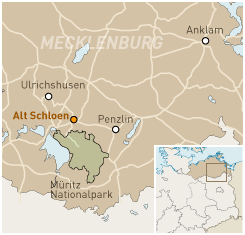Raise Bio: Organic farming
TThe goal of organic farming is to cultivate the land in harmony with nature. It intends to make use of the cycles
of nature without interfering into them too much. By doing this, organic farming not only protects land and potable
water but also supports climate protection by the direct distribution of their products. The EU-Eco-regulation demands
a general species-appropriate husbandry and the abandonment of genetic engineering, artificial fertilizers as well
as of chemical pesticides. Because of its intact nature, the region Mecklenburg-Western Pomerania offers good conditions
for organic farming. Beside Bavaria and Brandenburg, it takes a leading role in the production of organic goods.
On a long-term basis, ten per cent of the agricultural space of Mecklenburg-Western Pomerania shall be committed to organic farming. In order to better distribute the organic products on national markets, the regional seal "Bio-Zeichen Mecklenburg-Vorpommern" has been created. Even more strict than the regulations for those seals mentioned are the demands for a membership in organic farming associations. One of them, BIOPARK, was founded in Mecklenburg-Western Pomerania in 1991 and meanwhile has attracted members residing in 15 federal states. In order to gain the BIOPARK-seal, a farm has to work exclusively according to certain principles of organic farming. Also, the soil can only be fertilised with cow, sheep, goat or horse dung. In contrast, the EU-Eco-regulation allows to run a farm partly with conventional partly with organic measures. It also tolerates the fertilisation of soils with conventional liquid manure.
www.bmelv.de
www.bio-mv.de
www.biopark.de
On a long-term basis, ten per cent of the agricultural space of Mecklenburg-Western Pomerania shall be committed to organic farming. In order to better distribute the organic products on national markets, the regional seal "Bio-Zeichen Mecklenburg-Vorpommern" has been created. Even more strict than the regulations for those seals mentioned are the demands for a membership in organic farming associations. One of them, BIOPARK, was founded in Mecklenburg-Western Pomerania in 1991 and meanwhile has attracted members residing in 15 federal states. In order to gain the BIOPARK-seal, a farm has to work exclusively according to certain principles of organic farming. Also, the soil can only be fertilised with cow, sheep, goat or horse dung. In contrast, the EU-Eco-regulation allows to run a farm partly with conventional partly with organic measures. It also tolerates the fertilisation of soils with conventional liquid manure.
www.bmelv.de
www.bio-mv.de
www.biopark.de
Old Schloen
A point where rivers meet Land confiscation Organic farming - Alternative agriculture Raise Bio: Organic farming
